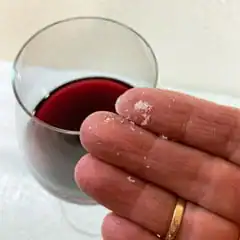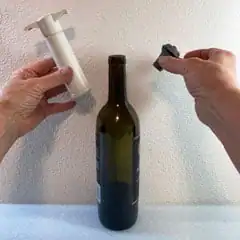Have you ever thought about why pairing cheese with wine makes the wine taste better? Maybe you’ve also noticed how a ‘meh’ glass of wine becomes more pleasant after you’ve started a properly seasoned meal. In both cases, the underlying reason is that the salt in the food is balancing the flavors in the wine.
In this article, I explain a bit of the science behind why this works. I also provide tips to use salt to improve the taste of your wine even when you don’t want to consume any food while you are sipping.
How Does Salt Improve Flavor?
The short answer is that salt improves the overall flavor of food because it suppresses our ability to taste bitterness, while not affecting our ability to detect other flavor components such as sweetness or umami.
There are scientific studies that go over the details of why this is the case, and if you’d like to read the research a good place to start might be Salt enhances flavour by suppressing bitterness. It is important to note that is a function of the sodium content of salt (NaCl) and you will not get the same flavor enhancement from salt substitutes such as potassium chloride (KCl). For more about sodium content in salt, you might also want to refer to my article Salt Comparison Guide: Salt Sodium Content.
So blocking the bitter flavor component in a glass of wine will instantly allow you to taste the sweetness from the sugars in the grapes balanced with the acid notes from the fruit. Voila! A better glass of wine – let me tell you how.
Using Salt to Make Red Wine Taste Better
Using this technique works particularly well with average red table wine. A bit of salt can make each glassful taste bigger, bolder and more nuanced. When I open a bottle of wine, it tends to last for several days, so I pump the air out of the bottle with a great tool that I will link below. This keeps the wine close to it’s original state when opened. The salt technique works great with opened wine, especially if you are starting to get a bit of sour aftertaste after the bottle has been open a couple days. Salt will instantly smooth that out.

Pour a serving of wine into a glass. Taste a small sample of it.
Now add a tiny bit of Maldon salt, as shown. Taste again and be amazed.
I start with this much salt. After the taste test I may add a bit more. Be sure to use a very small amount until you get a sense of how it the improves the flavor.

You can use any sodium chloride salt for this technique. I prefer Maldon because it dissolves instantly (you can see it disappear in the glass) and it’s non-dense crystalline structure makes it easy to measure a very tiny amount. The next best choice would be non-iodized sea salt. Kosher salt can be slow to dissolve and the crystals are big. You want to make sure you can’t see salt crystals sitting in the bottom of your glass – that’s too much sodium. If all you have is large coarse grains, run the salt through a grinder first.
This is a 240 gram (about 8.5 ounce) package of Maldon salt. It comes in the traditional (and recyclable!) green box.
Using Salt to Make White Wine Taste Better
In white wine, salt improves the the flavor by ‘popping’ or maximizing the fruit forward taste of the wine. Salt also makes the wine taste better by deemphasizing sour notes or after-taste. Like in red wine, the salt allows the subtlety in the wine to come through.
To salt white wine, just follow the red wine example above: pour, taste, add the tiny bit of salt, taste again and adjust as needed.
Will My Wine Taste Salty?
Nope! At least, it won’t if you follow my guidelines above of how much salt to add. A very small amount of sodium is needed to boost the flavor of wine. In this case, more is not better and no one wants to drink salty tasting wine.
Using Salt to Make Other Beverages Taste Better
I doubt that I would find many people that would argue that salt won’t improve the taste of drinks like a Margarita. Especially if your limes are a little on the bitter side, sipping your drink with a nicely salted cocktail rim will make for a pleasant experience!
What might surprise some folks though, is that a pinch of salt can also improve a cup of coffee! You can quickly defeat bitterness that is often present in coffee beans by adjusting the flavor with salt. Learn more about that in Coffee Conundrum: Does Salt Really Take The Bite Out of Bitter Beans.
Other ideas include adding a pinch of salt to Seltzer (hard or regular) and citrus fruit juices that are tasting a bit too bitter. Some beers are also on the bitter side and could use adjustment from a pinch of salt.
Storing an Opened Bottle of Red Wine
Don’t waste good red wine! After pouring out a glass or two, the best way to retain the flavor of the rest of the bottle is to get the air out of the bottle. If the oxygen from the air remains in contact with the wine, the wine continues to ‘open’ and soon starts changing in flavor and not in a good way.
There are all kinds of fancy devices on the market that rely on this fact – such as nitrogen replacement systems and such. The best (and simplest) tool I’ve ever found is called a VacuVin. I’ve been using the same one for over thirty years. Works great. I predict that you will no longer hesitate to open a bottle of red when you just want a single glass.

The VacuVin Wine Saver allows you to remove the air from an opened bottle of wine. It comes with 2 reusable bottle stoppers that work with the VacuVin pump.
At no cost to you, we may earn a commission if you use the link above to make a purchase.
The VacuVin works fine on bottles of white wine too, including bottles with screw-on tops. While white wine does not suffer as much from oxidation as red wine does, removing the air from the bottle is still a good thing to do. If you store your opened white wine in the refrigerator, white white will stay fresher and won’t pick up flavors from other things in the ‘fridge.
Final Thoughts
It turns out that adding salt to wine is not a new idea at all! Ancient Romans were even known to use seawater in the making of their wine for for salt. If you’d like to know more about that – and how current day winemakers are experimenting with similar techniques, check out this interesting article Why Winemakers Are Adding Seawater to Their Wines. But first, pour yourself a glass of wine, add a pinch of salt, then enjoy reading!
Table of Contents
Featured Photo by Julia Filirovska.








